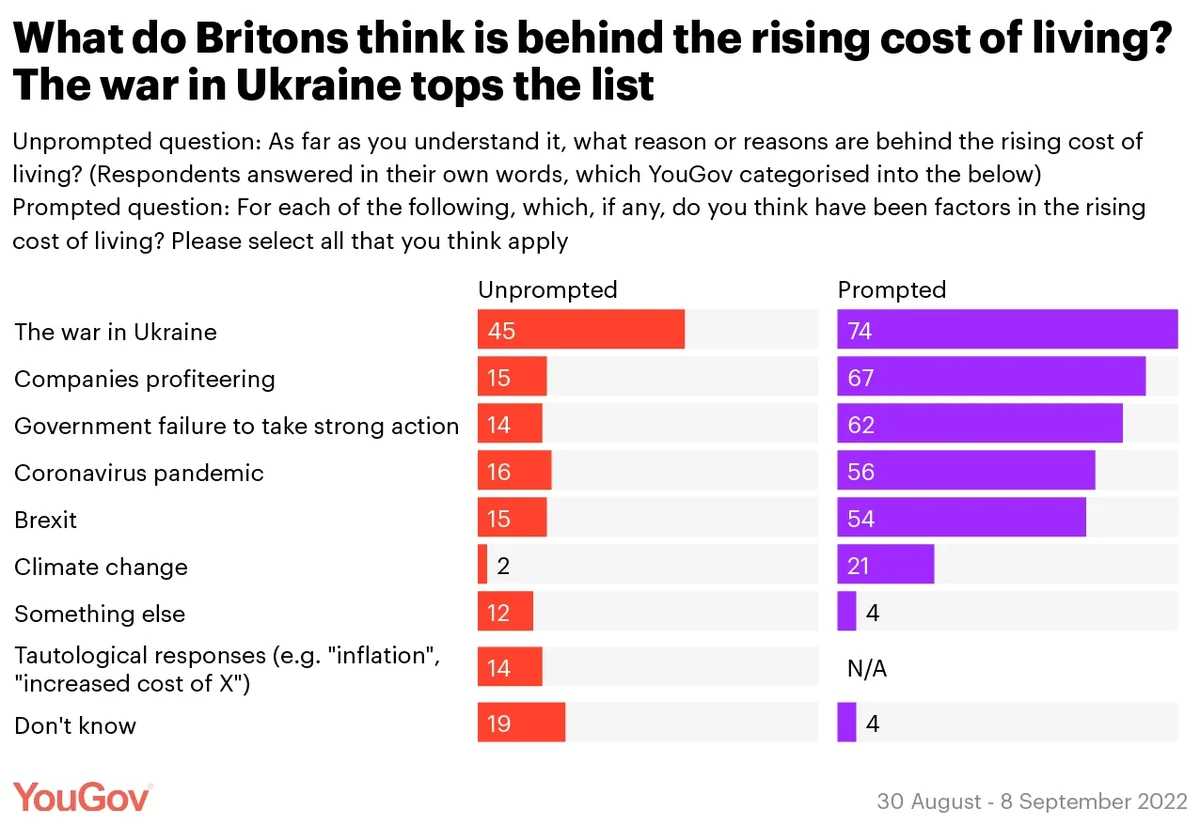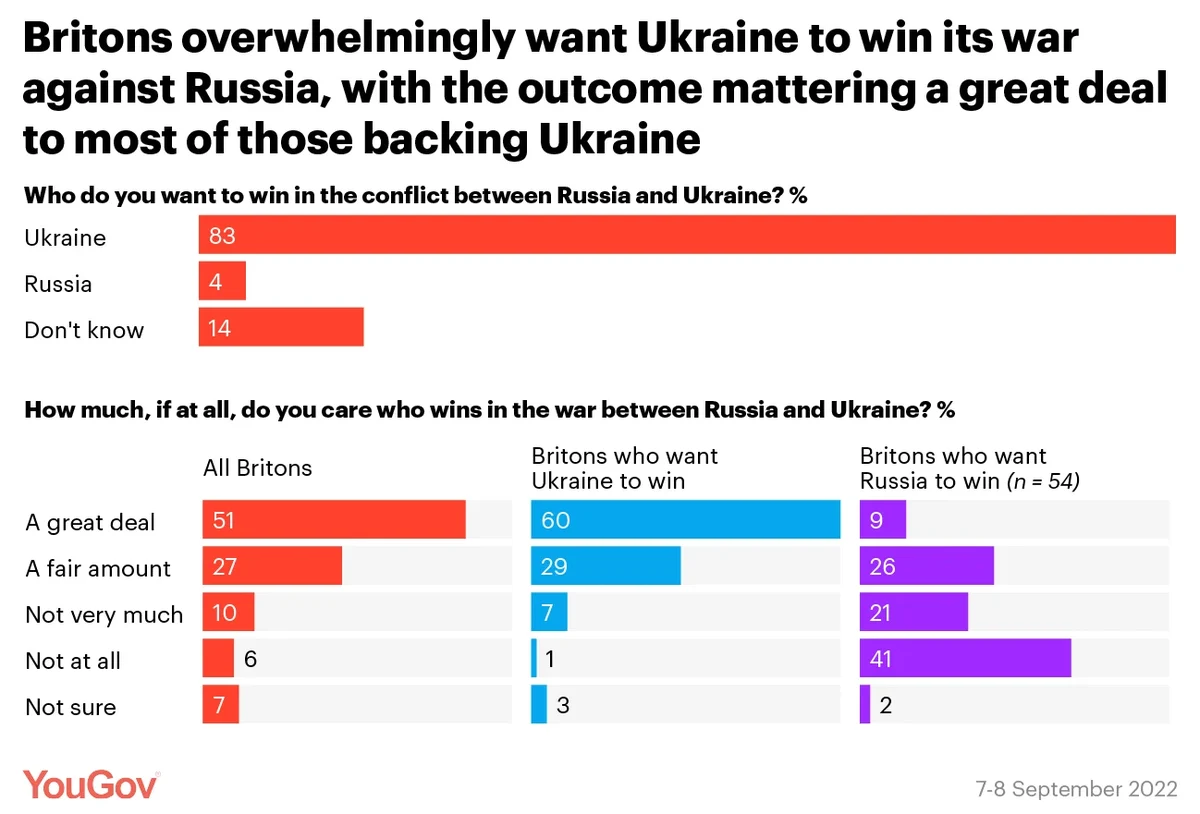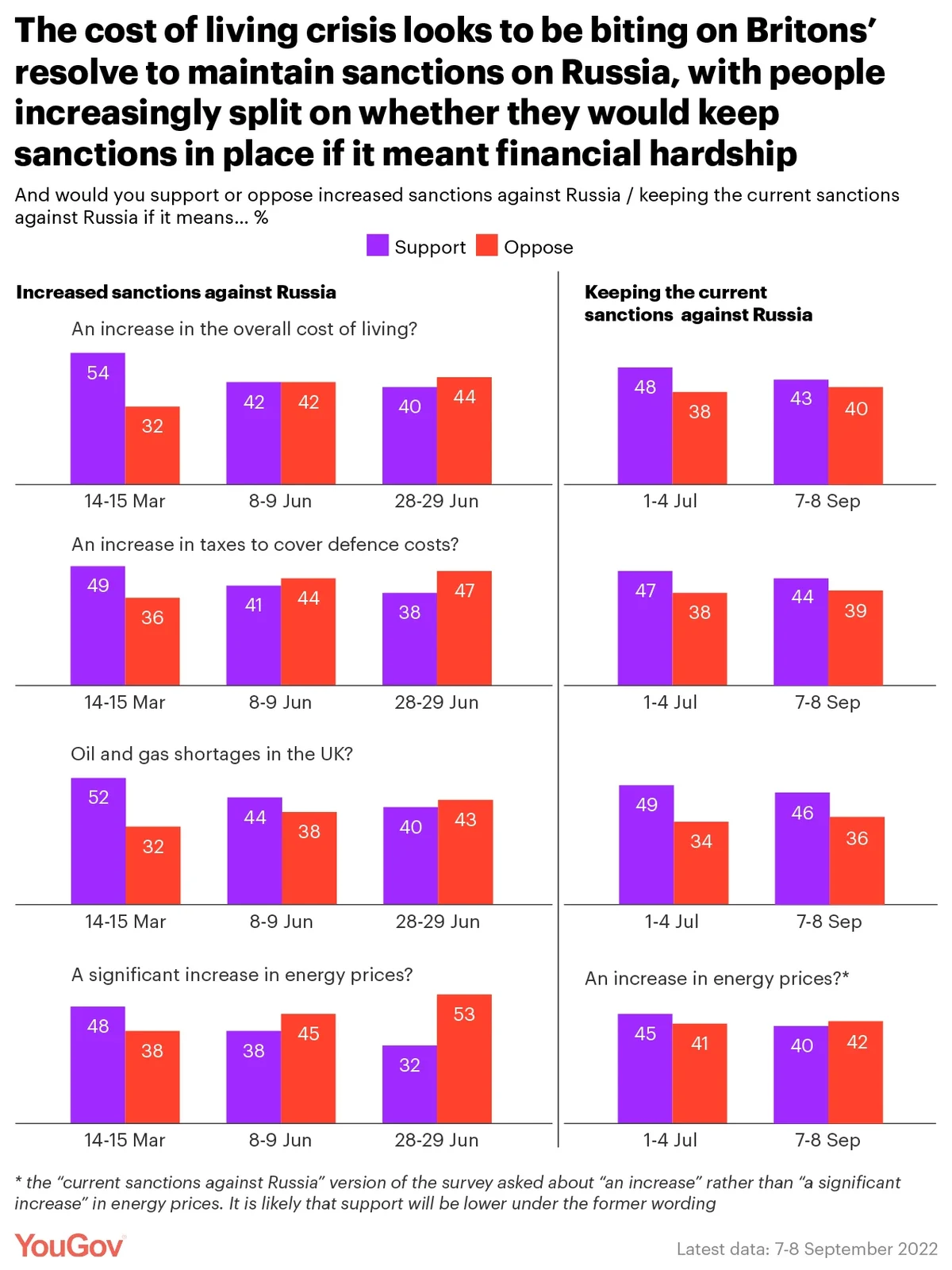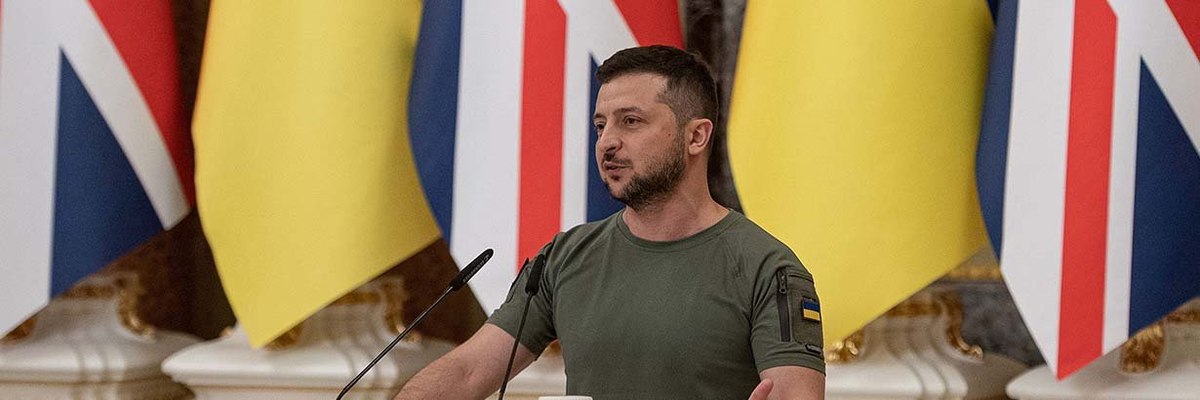Support for Ukraine is strong, but Britons are divided when asked to prioritise helping the beleaguered nation versus assisting with the cost of living back home
According to the CEBR in a study in March, UK living standards were predicted to drop by an average of £2,553 per household in 2022, with about half of this number (£1,259) a direct consequence of the war in Ukraine. The war has caused significant disruption to global food and energy markets, and the sanctions imposed by western countries on Russia also cost consumers back home.
But Britons are not economists, so do they attribute heir rising bills to conflict in Ukraine? The answer is very much yes.
Asked an open question on what reasons are behind the rising cost of living, Ukraine was by far the most common answer, with 45% saying so unprompted. Other reasons like companies profiteering, government inaction, COVID-19 and Brexit were only brought up by 14-16% of respondents.
Asking the same question again, only getting respondents to choose specific options from a list, sees Ukraine once again the top answer, with 74% picking it in the prompted version of the question. The other factors rose much more significantly in this version of the question, with two thirds of people (67%) saying corporate profiteering when offered the choice, and likewise 62% saying government inaction.

So while Britons clearly recognise that Ukraine is a factor in the rising cost of living, how big a factor do they think it is?
Overall, half of Britons (50%) consider the war in Ukraine to be a ‘major’ factor in the rising cost of living. Almost exactly as many (49%) say the same of companies profiteering, and 45% say that government failure to take strong action has been a major factor in the crisis.
Most Britons want Ukraine to win, but when asked to balance support for Ukraine against cost of living issues they are more divided
With Britons feeling the pinch from the cost of living crisis, given that they recognise that the Ukraine war is a major factor, what does this mean for support for helping Ukraine?
Support for Ukraine is certainly very high. Currently, 83% of Britons say they want Ukraine to win the war against Russia. Only 4% prefer a Russian victory.
Half of Britons (51%) say it matters a great deal to them who wins the war, and a further 27% say it matters to them a fair amount (among Britons who want Ukraine to win those figures are 60% and 29% respectively).

Likewise, when asked about specific actions that could be taken to support Ukraine or hinder Russia, support remains about as high now as it was at the beginning of the invasion. For instance, 75% currently back further economic sanctions on Russian interests in the UK, 69% support sending additional weapons and supplies to Ukraine, and 58% back sending additional troops to support NATO members in Eastern Europe.
However, when questions on measures against Russia are combined with the explicit prospect of financial hardship, support drops substantially.
Currently, 68% of Britons think the current sanctions against Russia are about right or need to go further. However, when asked if they would want to keep the current sanctions in place if it meant either an increase in the cost of living, higher energy bills, higher taxes, or oil and gas shortages, support for maintaining the sanctions in each case stands at only 40-46%. Opposition sits at between 36% and 42%.

Support for sanctions against Russia in the face of negative financial consequences has been eroding over the course of the cost of living crisis, with these latest figures marginally less supportive than the last survey in early July.
Breaking the latest numbers down by household income (which ought to serve as a proxy for exposure to the negative effects of the cost of living crisis) shows that support for keeping sanctions in place increases with income. However, there is not a commensurate decrease in opposition among less affluent households, who are instead more likely to respond “don’t know”.
Asking Britons more directly whether to choose between supporting Ukraine or withdrawing aid in order to help with the cost of living finds the public split. While 37% prefer the government to “maintain the measures it is taking to support Ukraine/oppose Russia, even if it means they cannot do more to help Britons with the increasing cost of living”, an almost identical 38% would prefer it “do more to help Britons with the increasing cost of living, even if it means withdrawing some or all support for Ukraine and making a Russian victory more likely”.
However, those who consider the war in Ukraine to be a major factor in the rising cost of living are more likely to support prioritising aid to Ukraine over extra cost of living assistance, by 47% to 32%.
Among the large majority of Britons that want Ukraine to win, 43% are in favour of maintaining support for Ukraine versus 34% who would rather prioritise the cost of living. The half of Britons who care a great deal that Ukraine wins are noticeably more emphatic, with most (55%) wanting to keep support for Ukraine and only 23% caring more about the government helping household finances.
Again, breaking the results down by household income shows no difference in the number of people (36-40%) who say the government should focus more on helping with the cost of living even if this comes at the expense of Ukraine. While those in the lowest income group (those in households with an income below £20,000 a year) are less likely to say support for Ukraine should be maintained (34%) this is because they are more likely to answer “don’t know” rather than wanting to prioritise the cost of living.
However, most people don’t think the government has to choose between Ukrainians and Britons just yet. Six in ten (61%) believe that the government has a great deal or fair amount of capacity to help bring down the cost of living for Britons before it would have to lessen or scrap the amount it is doing to support Ukraine/oppose Russia. This includes two thirds (66%) of those who would rather the government prioritise the cost of living over Ukraine.
Only 20% of Britons think the government is running out of options before having to withdraw support for Ukraine.
This last question suggests that there is still some way to go before the cost of living crisis begins to result in serious calls for spending to be redirected from Ukraine or sanctions on Russia to be lifted. For the time being, supporting Ukraine and assisting Britons with the cost of living are not seen as mutually exclusive.
With public support for the beleaguered nation so strong it doesn’t seem likely that spending surrounding Ukraine will be the first place people point to for cash, particularly when so many see the profiteering of energy firms as playing a major role in their current financial woes (and with windfall taxes being so popular).
Photo: Getty
See the unprompted cost of living results here











